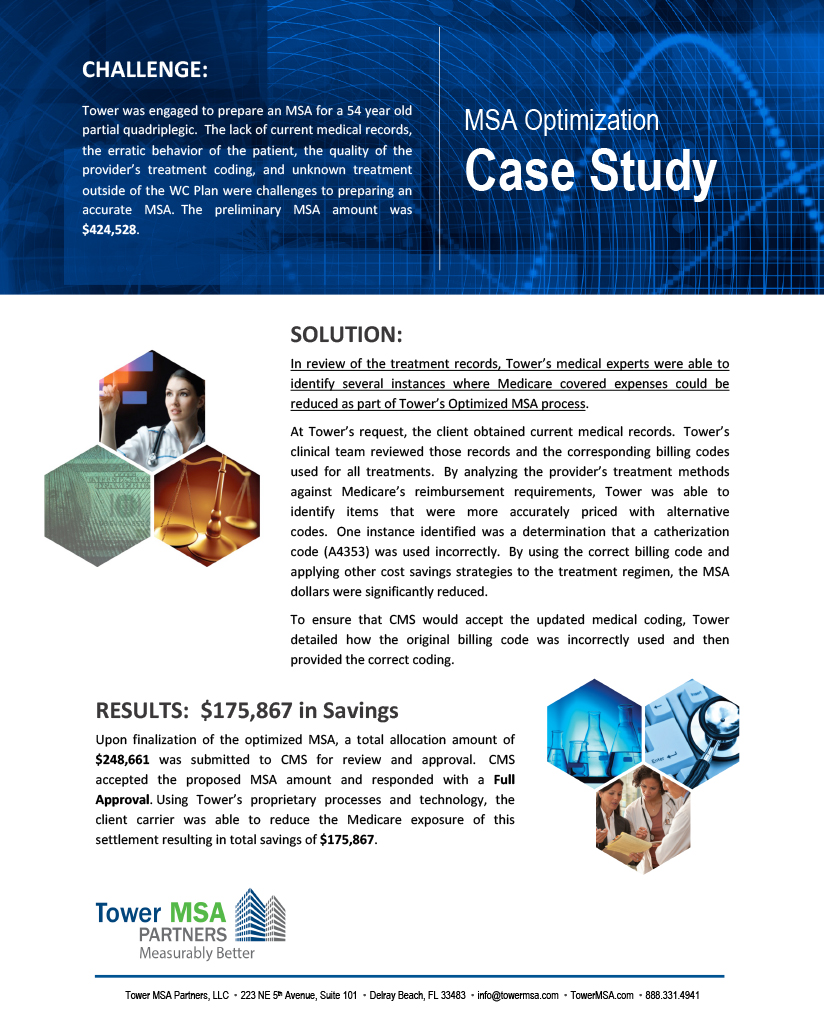Pre-MSA Triage Works!
January 21, 2016


Inappropriate and/or unnecessary prescription drugs, along with recommended medical procedures that are recommended, but never performed, are all too common in workers’ compensation claims. Yet they are often overlooked when moving a claim to settlement. But a new tool is helping payers identify and address obstacles, saving millions of dollars in MSA and settlement costs. Several recent cases bear out the program’s success.
Tower MSA Partners developed this unique service to ensure MSAs include only accurate and appropriate medical and pharmaceutical treatment. The Pre-MSA Triage allows payers to stage claims for optimal outcomes by providing a snapshot of MSA exposure before the MSA. By following our recommended interventions, clients are achieving CMS approval of reduced MSAs, with reductions of more than 50% in many cases.
How it works
Tower analyzes 6 months of medical records to identify care and cost issues, including the projected MSA cost of a claim based on the current medical and pharmacy treatment regimen. The review also provides a snapshot view of the MSA exposure in a non-discoverable (not an MSA) format, and offers an overview of inappropriate, unnecessary treatment and cost drivers that may impact MSA and settlement. For example, the review may uncover denied injuries and/or body parts, recommended surgical procedures that were never pursued, spinal cord stimulators that were recommended but never evaluated, gaps in treatment dates, unrelated medications, and off-label drug usage.
We then recommend various interventions, such as physician peer review, clinical oversight and conditional payment searches/negotiations to effect improved outcomes and savings in the overall claim costs, frequently as much as 50 percent!
Example Case Study
Tower’s Pre-MSA Triage projected the MSA cost for a 46-year-old male at $1,300,000. More than $1,000,000 of the total projection was due to extended prescribing of both long and short acting opioids. Tower recommended a Physician Peer Review followed by direct dialogue with the treating physician. Agreement to wean was obtained in writing and Tower initiated its clinical nurse oversight service to track progress.
Through Tower’s MSP Automation Suite, developed and maintained internally, we were able to drive the weaning process with the physician through tracked monthly calls, and to guide the adjuster as to when discontinued medications should be blocked by the client’s PBM.
Upon finalization of the weaning process, Tower worked with defense to obtain the necessary written language from the treating physician to confirm discontinuation and remove past medications. The final MSA was submitted and approved by CMS for $210,641 – a savings of more than $1,000,000 from the original estimate!
Conclusion
The example provided here is one of many success stories we are seeing, and through our MSP Automation Suite, we’ve been able to manage the process from triage through final CMS submission and approval in a secure, digital environment. Whether handled internally by our team of nurses or through a formal intervention and peer dialogue by one of our physicians, our system drives every step in the process.
Many companies can identify problems, and some even make recommendations. At Tower, we believe the key to successful MSA outcomes is a proactive approach to identify, intervene and remain involved through closure.

